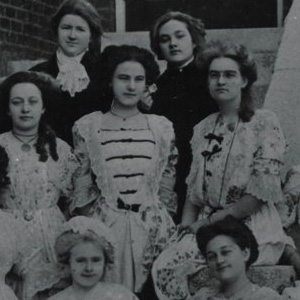
As a progressive institution, the Training School developed innovative and inclusive curricular approaches to education, especially ones practicable from the elementary level to high school and beyond. Sallie Joyner Davis, a charter faculty member and East Carolina’s first instructor of history, advocated for the use of pageants as an inclusive, flexible way to make history come alive through meaningful, costumed re-creations of important events. Davis’ approach to history teaching viewed students as active, participatory learners who should be creatively involved in history education. Davis’ pageant strategy flatly rejected the view of students as passive recipients of information delivered from on high.
Progressive scholarship favored new approaches to teaching history appealing “to the child’s mind by as many avenues as possible – eyes, ears, hands, and vocal organs.” Such thinking meshed well with Davis’s advocacy of pageants. In 1911, ECTTS staged its “first colonial entertainment” presenting history students in colonial costumes. Three years later, in February 1914, history students staged their “Colonial Pageant” in the Training School auditorium, this time including Model School students as well. The 1914 pageant was based loosely on Esther Willard Bates’ Pageant and Pageantry. Unlike Bates’s script centered in New England, Davis’s rendition featured local history in the form of the Edenton Tea Party, as well as American history with the proclamation of the Declaration of Independence. As a grand finale, all actors appeared on stage and sang “America” in unison with the audience.
Davis hinted that the required history curriculum for public schools – North Carolina and American history, between the fifth and seventh grades – could be best taught with pageants. Long before Paul Green’s The Lost Colony began in 1937, Davis noted that North Carolina history might begin with “Sir Walter Raleigh presenting the two Roanoke Indians, Manteo and Wanchese, at the court of Elizabeth.” Yet Davis was not quick to envision pageants as a means of addressing history much beyond the colonial period, perhaps finding recent subject matter too sensitive for most to find entertaining. History as Davis imagined it reflected Jim Crow, white supremacy, and surely nationalistic blinders: pageants would depict, in grand costume and spectacular performance, the rise to power of white colonists and their ideals in the conquered land.
Locally, pageants quickly became a common pedagogical strategy. In celebration of North Carolina Day, students at Greenville High School, located across Fifth Street from ECTTS, staged a state pageant. Training School students as well as those at the Model School, and even the Evans Street Graded School also staged historical pageants. Shortly after WWI ended, the Training School staged an “effective and beautiful war pageant” depicting the various countries involved in the war and their reasons for entering. Greenville Chautauqua events annually featured pageants in their repertoire. Davis was thus hardly the only advocate of pageants as a way of teaching history, but the popularity of this approach in eastern North Carolina had much to do with her advocacy and orchestration of Training School pageants as tools for embodied learning about the past.
Sources
- “Beautiful War Pageant Given By Juniors Saturday.” Greenville News. February 24, 1919.
- Bates, Esther Willard. Pageants and Pageantry. Boston: Ginn and Company, 1912.
- Davis, Sallie Joyner. “The Use of Pageants in Schools.” Training School Quarterly. Vol. 1, no. 3. October, November, December, 1914. Pp. 132-135.
- Dynes, Sarah A. “The Function of the Teacher as an Interpreter of History.” Vol. 1, no. 2. Training School Quarterly. Vol. 1, no. 2. July, August, September, 1914. Pp. 80-88.
- “Great Occasion High School Bldg.” Greenville News. December 20, 1917. P. 1.
- “Model School Pupils Present A Charming Entertainment.” Greenville News. December 13, 1919. P. 1.
- “Pageant Presented to Training School.” Greenville News. May 23, 1918. P. 1.
- “The Educational Pageant Monday.” Greenville News. May 23, 1921. P. 4.
Additional Related Material

Citation Information
Title: Pageants and Pedagogy
Author: John A. Tucker, PhD
Date of Publication: 6/18/2018